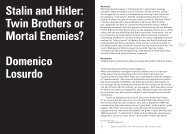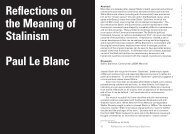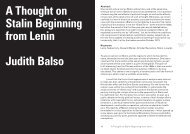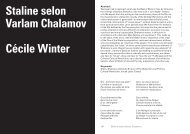adrian
adrian
adrian
- No tags were found...
Create successful ePaper yourself
Turn your PDF publications into a flip-book with our unique Google optimized e-Paper software.
quotation from the Science of Logic. 41Rather than seek to rebut Pippin through explicitly contestinghis overriding stress on references to apperception by Hegel whileimplicitly conceding the accuracy of Pippin’s interpretation of thesesame references (as some of his other critics have done), I will, in whatfollows, attempt to demonstrate why and how the very moment to whichPippin appeals actually does not bring Hegel back into the proximityof the specifically subjective idealism of Kantian transcendentalism.As is appropriate in a Hegelian discussion about Hegel, my critiqueof Pippin is immanent rather than external, working from the insideand developing itself out of Pippin’s own chosen starting point. Thatsaid, a first manner of objecting to Pippin would be to note that Hegel’spraise for Kant’s transcendental unity of apperception is preceded bymoments in both the Phenomenology of Spirit and the Science of Logicitself (as well as other articulations of the Logic) in which the allegedtwo-worlds metaphysics of the subjectivism of Kantian (and Fichtean)transcendental idealism is dialectically sublated. 42 This means that, asone might describe it, Hegel pays Kant a backhanded compliment, withthe principle of unity extolled already being, at this late stage in HegelianLogic, so heavily qualified by Hegel’s Kant critique as to no longer reallybe Kantian per se.Directly related to this, Pippin appears not to appreciate inrelation to the above-quoted lengthy passage from the Science of Logicjust what a huge difference Hegel’s own distinction between subjectiveand objective/absolute idealisms makes to the significance of hisreference to Kant’s transcendental unity of apperception (althoughsuch Hegelians as Westphal and Thomas Wartenberg do appreciateprecisely this 43 ). This Hegelian distinction surfaces in both thePhenomenology and stages of the various versions of the Logic comingwell before the “Subjective Logic” consisting of “The Doctrine of theConcept” inordinately privileged by Pippin. 44 For Kant, this principle ofunity at the heart of the first Critique’s “Transcendental Deduction” isthe Ur-core of all genuine knowledge both actual and possible. But, thisCRISIS&CRITIQUE#3very nucleus of the theoretical part of critical philosophy is, of course,ensconced within the framework of the subjectivism of transcendentalidealism. Consequently, for Hegel, Kantian subjective idealismresults in the ridiculous thesis that, as he puts it in the introductionto the Science of Logic, cognizing subjects are limited to having trueknowledge solely of false appearances (which makes a mockery of thevery notions of truth and knowledge). 45 Hegel observes therein:This is like attributing to someone a correct perception (richtigeEinsicht), with the rider (Zusatz) that nevertheless he is incapableof perceiving (einzusehen) what is true (Wahres) but only what isfalse (Unwahres). Absurd as this would be, it would not be moreso than a true knowledge (wahre Erkenntnis) which did not knowthe object (Gegenstand) as it is in itself (wie er an sich ist). 46Hegel uses the word “Gegenstand” in both this quotation and thelong, above-quoted passage from the Science of Logic relied upon byPippin (in the latter, he alternates between “Gegenstand” and “Objekt”when referring to the “object” forming the correlate of the subject quatranscendental unity of apperception). By contrast with subjectiveidealism as Kantian transcendentalism (here specifically its anti-realismregarding objects treated as mere phenomenal appearances [i.e., as“false”] deprived of the actuality of ontological heft [i.e., as “true”]),Hegelian absolute idealism is robustly realist regarding the objectivitiesrelated to by subjectivities 47 (in the 1801 Differenzschrift, Hegel is willing,pace Kant, Fichte, and a certain Reinhold, to acknowledge that even amaterialism such as that of Baron d’Holbach is not without its relevanceto his and F.W.J. Schelling’s absolute idealism 48 ). However, Hegelarrives at this absolute idealist position in a non-dogmatic and properlypost-Kantian fashion by virtue of achieving a reaffirmed ontologicalrealism precisely via an immanent critique passing through (and notsimply bypassing altogether) Kant’s critical problematizations of pre-Kantian realist ontologies. 49CRISIS&CRITIQUE#341 Harris 1989, p. 26; Sedgwick 1993, pp. 273, 275; Stern 2009b, p. 48.45 Hegel 1969a, pp. 45-47.42 Hegel 1977c, pp. 88-91, 100-101; Hegel 1969a, pp. 121, 134-135, 490, 507; Hegel 1991c, §44 (p. 87),§60 (p. 105); Hegel 2008, §44 (p. 37).43 Westphal 1993, pp. 263-272; Wartenberg 1993, pp. 104-107, 109-110, 117, 120, 122, 125-126, 128.44 Hegel 1977c, pp. 139-146; Hegel 1969a, pp. 45-47, 51, 61-64, 489; Hegel 1991c, §41-42 (pp. 81-84),§45 (pp. 88-89); Hegel 2008, §43-44 (pp. 36-37).46 Hegel 1969b, p. 39; Hegel 1969a, p. 46.47 Hegel 1969a, pp. 154-155; Johnston 2014a, pp. 13-64; Johnston 2014c.48 Hegel 1977a, p. 177.49 Hegel 1975, p. 57.382 “Where to Start?: Robert Pippin, Slavoj Žižek...383“Where to Start?: Robert Pippin, Slavoj Žižek...






